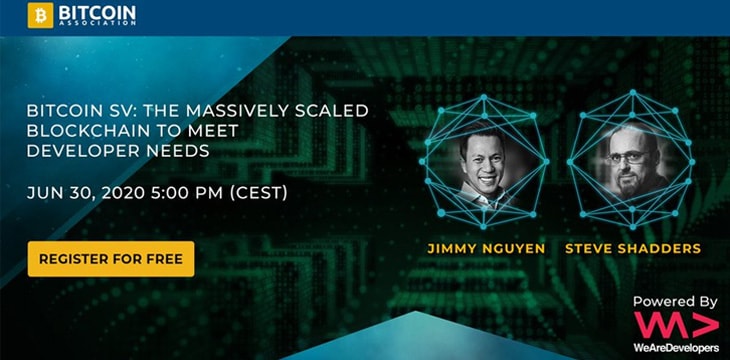|
Getting your Trinity Audio player ready...
|
Bitcoin Association Founding President Jimmy Nguyen and nChain CTO Steve Shadders took the WeAreDevelopers virtual stage on June 30 to talk about “Bitcoin SV: The massively scaled blockchain to meet developer needs.”
The webinar explored the four pillars of Bitcoin SV (BSV)—its stable protocol, massive scalability, security, and instant, yet safe, transactions—and why these features of Bitcoin allow software engineers to create in a way that is not possible on other blockchains.
Why Bitcoin?
To kick off the webinar, Jimmy Nguyen dove into a few of the many reasons that building on the Bitcoin blockchain presents software engineers with opportunities that are not possible on other blockchains. Two focal points of this idea are the stability of Bitcoin as well as the massive scalability that is only possible on the original Bitcoin BSV.
Nobody, especially enterprises, wants a protocol that is constantly changing, this is why blockchain’s like Ethereum are bound for failure (or in my opinion, why they have already failed). Building on a protocol that is constantly shifting is like building a house on quicksand—the foundation of the house will not be stable which is why that foundation will be an unattractive option for anyone looking to build.
In regards to transaction throughput, any meaningful business is going to need to operate at scale, assuming they have several customers creating requests or are working with large data. In regard to both a stable protocol and high transaction throughput, Bitcoin is the only blockchain that kills both of these birds with just one stone—the Genesis protocol upgrade set the Bitcoin protocol in stone.
During the Genesis upgrade, the artificial limits implemented via BTC were removed as well as the transaction size and data capacity limits. This upgrade led to the creation of the world’s largest block—369 MB and paved the way for the BSV network to process up to 6,400 tps.
These developments make it increasingly clear that Bitcoin is more than just a payment system, and show that Bitcoin is technology plumbing that will allow the creation and development of many applications and services.
Shadders went on to explain why software engineers need low latency and big blocks. “Big transactions and big blocks make a lot of things possible that you don’t see on other blockchains,” said Shadders, citing WeatherSV as a great example of an application that would not be possible without unlimited transaction sizes and high throughput.
Interested in using Bitcoin?
Shadders and Nguyen went on to recommend a few crucial resources that will help any software engineer that is looking to learn more about Bitcoin. For instance, the Bitcoin SV Wiki is one of the best resources available for learning Bitcoin from the ground up.
You should also look out for the online training programs that the Bitcoin Association will be offering for Bitcoin developers of all experience levels in the near future—you can expect to see more on that front before the end of the year.
And if you already have a background in software engineering, then you are going to want to attend the Bitcoin SV DevCon 2020. Organized by Bitcoin Association in partnership with WeAreDevelopers, the virtual event on July 18-19 will be full of information, content, and advice from nChain and other notable leaders in the Bitcoin space.
Check out the full agenda and register to join the two-day Bitcoin SV DevCon 2020 event here.

 02-25-2026
02-25-2026 




